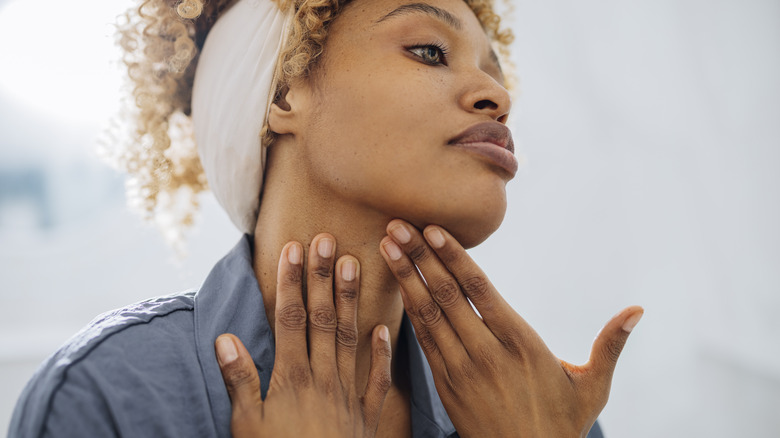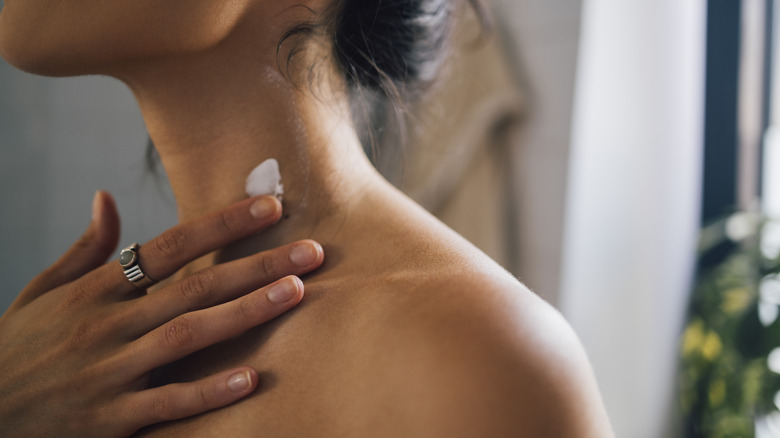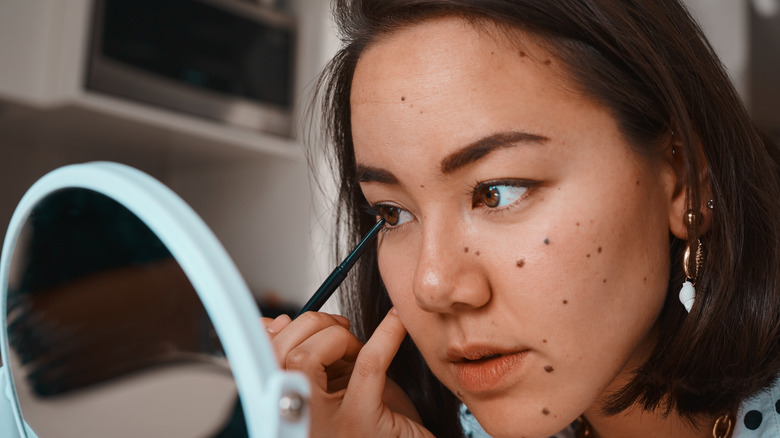The 6 Best Ways To Treat Dry Skin On Your Neck
Dry skin anywhere on the body is most common in the winter (for those who live in areas that get colder in the winter months), but anyone can develop dry skin on their body at any time. And if your skin is dry, it's probably not looking or feeling its best. "When skin is dry, the outermost skin cells do not shed off appropriately and contribute to dullness and flakiness," board-certified dermatologist Dr. Blair Murphy-Rose told Skincare.com. Dry skin on the neck, in particular, is a more common problem than you might think because — just like the skin on our face and bodies — our necks need extra care to stay hydrated. It turns out they're pretty susceptible to dryness.
"Our neck has a thinner dermis, which is made up of collagen," board-certified dermatologist Dr. Tiffany Libby, told Byrdie. "Our neck also has fewer sebaceous glands, which secrete oil and natural moisturizers. This makes the area more prone to dryness." Sadly, dry skin, particularly in exposed areas such as the neck, can be uncomfortably sore and become a cosmetic issue. "Since dry skin leads to fine lines and wrinkles, hydration is key for the neck area," Dr. Neda Mehr, a dermatologist and founder of Pure Dermatology Cosmetic and Hair Center, told Good Housekeeping. But if you have dry neck skin, there are ways to treat it (and maybe even help prevent it).
Get your hands on moisturizers containing hyaluronic acid, glycerin, or ceramides
Moisturizing is the best way to treat dry skin on any area of the body, and the neck is no different. However, there are a few specific ingredients that will help to keep the area hydrated. Dermatologist Aanand N. Geria, MD FAAD at Geria Dermatology, previously told Women.com that hyaluronic acid, glycerin, and ceramides are all super hydrating ingredients to look for in a moisturizer. Dr. Tiffany Libby, a board-certified dermatologist, agreed when speaking to Byrdie. She also suggested a few more moisturizer ingredients that could help dry necks; colloidal oatmeal, shea butter, glycerin, squalene, aloe, and plant-based oils. Dr. Libby recommended trying a thicker cream product, or even an ointment if your neck is particularly dry.
Not only are the ingredients in your moisturizer important, but exactly when you apply it to your neck can also make a difference. She suggested putting on your moisturizing product right after a shower or bath for best results. "[That] helps minimize dry skin and flare-ups," she noted.
Wear a scarf (even in the summer) and always apply SPF to your neck
As we know, the neck's dermis is especially thin, making it incredibly susceptible to the sun's rays. And that's not good! "Sun is your neck's enemy," Dr. Theodora Mauro, a professor of dermatology at the University of California, told The New York Times. And if the skin on your neck is already dry, then exposure to the sun will only make it worse. "The water content in the skin is depleted and the Natural Moisturizing Factor (NMF) can be damaged due to a broken down skin barrier," Dr. Anand explained. "This will cause the skin to dry out further." That's why keeping your neck as shielded as possible from the sun via something like a scarf is a great idea. And, remember, SPF should be worn at all times. Even in the winter.
Keeping your neck out of the sun will not only help if it's already dry, but it will also help to prevent dryness in the future. Of course, the sun can burn the skin on the neck, which could result in dry, peeling skin. "UV rays damage and kill skin cells leading to sunburn, blisters, dry, dull and uneven skin tone, pigmentation and a major loss of collagen," Dr. Chytra Anand, cosmetic dermatologist and founder of Kosmoderma, told Vogue India.
Stop applying makeup to your neck
Many of us apply makeup to the neck to ensure it matches our face, particularly those of us who prefer a foundation that's slightly darker or lighter than our natural skin tone. But this could be what's behind your neck's dryness, as matte foundations in particular can make dryness worse. If you can't avoid putting makeup on the neck though, there are some ingredients to look out for and avoid, as they'll only worsen the dry patches. "Avoid ingredients that are potentially drying or irritating like clay, salicylic acid or other hydroxy acids, or retinol," Dr. Hadley King, a board-certified dermatologist, told Self.
But it's not just applying makeup to the area that could be making your neck dry. Removing that makeup could also be the issue, as some makeup removers are notorious for drying out the skin. And, if you're forgetting to moisturize your neck after using it, you're just asking for trouble. "Unfortunately, the same ingredients that take makeup off your skin may disrupt the microbiome — the healthy mix of good and bad bacteria on your skin's surface — and interfere with skin barrier function," dermatologist Dr. Joshua Zeichner explained to Women's Health. If you have to use makeup remover on your neck, though, Dr. Zeichner recommended trying one with probiotic ingredients.
If you're applying perfume to your neck, stop!
Many of us apply fragrance to our neck area because we're told it's a great place to spritz it so it will linger. But sometimes, too much perfume or aftershave can be what's drying out the area. Board-certified dermatologist Dr. Rebecca Marcus explained to Byrdie, "Perfume often contains alcohol, which is drying, and of course fragrance, which is a common cause of contact dermatitis," she shared.
Instead of applying scents to the neck area, there are plenty of other places you can spray it that will still last a while. If all of your skin is out of the question because of dryness and irritation (making the wrists or back of the ears a no-go too), then try applying a little scent to your hair. You can even purchase specific hair perfumes designed for your locks. Another good place to apply your fragrance? Your clothes. Just make sure it's not going on a material that will stain first.
Cut back on cleansing
If you cleanse your neck every time you cleanse your face (which should be twice a day), you may find that's just too much for your neck — especially when it's already dry. "There's this misconception that you need to wash your face intensely and frequently to keep it clean, and doing so too often can also remove the skin's natural moisturizing oils," chief of dermatology at Children's National Hospital in Washington, Dr. Anna Yasmine Kirkorian, told Self. And that theory could also be applied to your neck, particularly if you do the same to your neck as you do your face when it comes to your skincare routine.
If you are cleansing your neck twice a day, Dr. Shasa Hu, a board-certified dermatologist and assistant professor of dermatology at the University of Miami Miller School of Medicine, suggested cleansing it just once instead. That way, your cleanser will be less likely to irritate any existing dryness or make it even drier. It'll also give the neck a chance to maintain its natural oils. Whether you cleanse morning or night though will be totally up to you and your schedule.
Head to your doctor or dermatologist to find out if your neck dryness is due to a medical issue
Anyone can experience dryness on the neck. Or any part of the body, for that matter. But if you're constantly getting dry patches on your neck that won't go away, there's a chance that it could be related to a medical condition. If that's the case, you may need a specific treatment plan. Two of the more common dry skin medical conditions that may arise on the neck are eczema and psoriasis, both of which a doctor or dermatologist will be able to diagnose by examining the area. These conditions affect millions of people in the U.S., with the Cleveland Clinic reporting as many as 31 million Americans have eczema.
While a medical professional will be able to prescribe or suggest specific treatments, such as medication, creams, or ointments, there are ways to treat a dry neck due to contact dermatitis, eczema, or psoriasis at home. A cool compress placed on the affected area can help to alleviate any itching, while a calamine lotion can also be applied to the area to sooth it. Medical News Today also recommended a colloidal oatmeal bath to relieve itchiness.






